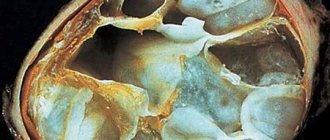Physical illnesses can be the result of stress
The idea of the existence of a direct connection between the soma (body) and the psyche (soul) arose a long time ago. Initially, European medicine was based on two approaches: holistic and anatomical.
The founder of the first, natural approach was Hippocrates. The leading thesis of his teaching was that a person is sick, and not any individual organ. Accordingly, it is necessary to treat the patient as a whole, since it is pointless to treat somatic illnesses without freeing the psyche from problems.
The anatomical approach preaches the opposite: it is necessary to detect the exact place affected by the disease and act exclusively on it, without taking into account the psychological state of the patient.
Since the middle of the 19th century, official medicine began to use an exclusively anatomical approach. And only in our time the situation began to change thanks to the active development of psychosomatic medicine.
How stress affects the body
Researchers working in the field of psychosomatics have provided convincing evidence that patient recovery is possible only by identifying and solving repressed psychological problems that trigger dangerous stress reactions.
According to supporters of psychosomatics, it is a chronic or sudden stressful state that is the cause of many somatic and neurological diseases. Stress marks a cascade of various physiological reactions leading to changes in the functioning of all organs and systems of the body.
1st signal. Musculoskeletal system
When a person is excited, scared, angry, his muscles tense. Muscle tension is a reflex response to stress, the body's natural way of protecting itself from injury and pain.
With sudden intense stress, the skeletal muscles tense at the same time, and then, when the stressful state has passed, the muscles relax.
Chronic stress causes muscles to be in a more or less constant state of “alert.” When muscles are tense for a long period of time, it provokes the development of other reactions in the body, which gives rise to many diseases.
For example, tension headaches or migraines are associated with chronic muscle spasms in the shoulders, neck and head. Pain in the lower back and upper extremities is also associated with stress, especially caused by exhausting monotonous work.
Millions of people suffer from chronic painful conditions secondary to pathologies of the musculoskeletal system. A common cause of chronic pain is how a person reacts to injury.
People who fear re-injury and pain, and seek only a physical cause and cure for their injury, generally have a worse prognosis for recovery than those who are free from fear and maintain a certain level of moderate, medically supervised activity.
What diseases do women get due to stress and how to deal with it?
Women react to stress differently than men. Although the sex hormones and neurochemical processes of the fairer sex protect to some extent from stress, women are more susceptible to its physical and emotional effects. Women do not run away from stress and do not fight it, but survive it for a long time.
How stress affects women
The natural anti-stress hormone oxytocin is produced in women during childbirth, breastfeeding, and in both sexes during orgasm. So in this regard, the fair half of humanity wins. However, women need much more oxytocin than men to maintain their emotional health.
According to Dr. Paul Rosch, vice president emeritus of the International Stress Management Association, women are less likely to be affected by abstinence and experience more relationship stress than men.
According to experts from the American Academy of Family Physicians, stress is an expression of the natural instinct of self-preservation. And while it may alert a woman to immediate danger, such as a fast-approaching car, long-term stress has negative effects on physical and emotional health.
Paul Roche
Professor of Medicine and Psychiatry at New York Medical College
Our response to stress has been carefully honed over millions of years as a defense mechanism. And this was wonderful for our ancestors, who had to run away from saber-toothed tigers. The tragedy is that today there are no tigers, but there are a lot of annoying things like traffic jams, to which our unfortunate body reacts like in the old days, earning hypertension, stroke and ulcers.
What diseases can you get due to stress?
According to the American Institute of Stress, 75–90% of initial visits to the doctor are for stress-related health problems. The effects of stress can manifest in a variety of ways, from headaches to irritable bowel syndrome.
Lori Heim
MD, President-Elect of the American Academy of Family Physicians
Stress comes in many forms, but if you're stressed about work, kids, neighbors, and your marriage all at the same time, it's no joke. In women, severe stress can lead to menstrual irregularities or, for example, unexpected hair loss.
Here are some other body reactions to stress:
- Eating disorders. Anorexia and bulimia are 10 times more common in women than men, and this is most likely related to stress levels. Like depression, these disorders are caused by a lack of serotonin and are often treated with antidepressants that increase the production of the happy hormone.
- Stomach ache. Stress makes you reach for unhealthy and “comfort” foods that are high in calories and easy to prepare. Another case: due to stress, you cannot eat anything at all. The main stress-related disorders are cramps, bloating, heartburn, and irritable bowel syndrome. Depending on whether you stress eat or, on the contrary, starve, you gain or lose weight.
- Skin reactions. Stress can aggravate existing conditions and cause itchy rashes or spots.
- Emotional disorders. Stress can lead to persistent low mood, irritability, or more serious mental problems such as depression. Women are better at hiding anger than men because they have a larger area of the brain responsible for such emotions, but women are twice as likely to be affected by depression. The impact of stress on women's emotional well-being can range from postpartum depression to depression during menopause.
- Sleep problems. Women who are stressed often have trouble falling asleep or sleep too lightly. And this is especially bad because good, healthy sleep helps reduce the negative effects of stress.
- Difficulty concentrating. Stress makes it difficult to concentrate and cope effectively with work and home affairs. If stress is caused by problems at work, and then it interferes with work, then it becomes a vicious circle.
- Heart diseases. Stress negatively affects the cardiovascular system, increases blood pressure, and leads to heart attacks and strokes.
- Decreased immunity. One of the most complex physical responses to stress is a decrease in the body's ability to fight disease, whether it be a cold or chronic illness.
- Cancer. Some scientists believe there is a link between stress and breast and ovarian cancer. Thus, it was found that the risk of developing breast cancer was 62% higher in women who experienced more than one difficult event, such as divorce or the death of a spouse.
How to Reduce Stress Levels
A study presented at a recent meeting of the Western Psychological Association found that 25% of your happiness comes from how well you manage stress. And the most important strategy for managing stress was planning or anticipating what might upset you and using stress-reducing techniques. And these techniques are as old as time.
Start eating right
Avoid junk food and eat balanced meals. This way you will improve your physical condition, and then your emotional one. Here are some of our articles to help you:
- “How to start eating right in the new year”;
- “Nutrition Science: What to Believe and What Not to Believe”;
- “Food for joy: foods that are guaranteed to improve your mood”;
- “How to strengthen your immune system with proper nutrition.”
Find time to exercise
Exercise is a phenomenal way to combat stress and depression. Research shows that exercise improves your mood and releases endorphins, natural chemicals that improve your emotional state.
- “The best workouts of 2015 according to Lifehacker”;
- “Running without excuses: tips for those who find it difficult to start”;
- "50 reasons to play sports."
Find ways to relax
Meet with relatives and friends with whom you enjoy communicating. Think about your previous hobbies. For example, knitting and lace-making reduce the effects of stress. Yoga, meditation and tai chi also successfully combat stress.
- “Yogic sleep for stress”;
- “Strengthening the heart and relieving stress through meditation”;
- “No stress: 4 apps that will help you calm down in minutes”;
- “How psychologists get rid of stress: 17 methods tested by professionals.”
If you feel that you are being haunted by constant stress, be sure to learn to manage it. Learn new techniques, consult a doctor, do not leave everything as it is until constant experiences have had too strong an impact on your body.
2nd signal. Respiratory system.
The respiratory system supplies cells with oxygen and removes carbon dioxide from the body. Stress and strong emotions are accompanied by respiratory symptoms such as shortness of breath and rapid breathing as the airway becomes smaller. For people who do not have diseases of the respiratory system, one-time short-term stress is not a problem, since the body can cope with the additional load in order to breathe fully and comfortably. But regular and occasional stressors can worsen breathing problems in people with pre-existing respiratory conditions, such as asthma and chronic obstructive pulmonary disease.
Studies have shown that acute intense stress, such as the death of a loved one, can trigger asthma attacks. In addition, stress-induced hyperventilation can trigger a panic attack in a person prone to anxiety attacks.
Working with a psychotherapist to develop relaxation methods and teaching breathing techniques helps prevent the development of diseases of the respiratory system.
Stress and its effects on mental health
According to studies in Russia and Belarus, approximately 70% of the population is constantly in a state of stress, of which 30% are in a state of severe stress. Studies have shown that 7 out of 10 Russians have experienced chronic fatigue syndrome at least once in their lives.
It is important to understand that stress only becomes dangerous when it is excessive and/or persistent. It must be remembered that even negative experiences are useful. It not only carries negative emotions, but at the same time is able to stimulate us to be active and make important decisions. It is impossible to completely avoid stress; it would make life boring and uninteresting. To better understand stress, it is important to know that life events themselves do not cause stress. The main thing here is how a person perceives the situation. Everyone reacts differently to what is happening, for example, for some, public speaking is a source of great stress, while for others it is a neutral or even pleasant situation. The causes of stress are varied, and the forms of manifestation are individual.
Stress (from the English stress - tension, pressure, pressure) is a nonspecific (general) reaction of the body to a very strong impact, be it physical or psychological, as well as the corresponding state of the nervous system of the body (or the body as a whole). It should be noted that stress comes in different forms: it can arise both in response to negative situations and to positive ones. In modern science, stress is divided into stress (the concept has two meanings - “stress caused by positive emotions” and “mild stress that mobilizes the body”) and distress (a negative type of stress that the human body is unable to cope with). The first type of stress occurs in everyone, but does not cause harm; on the contrary, it helps to mobilize strength and adapt to the situation. The second type (distress) is harmful to human health and can even lead to severe mental illness.
Symptoms of distress:
Physical manifestations:
- muscle tension, especially in the neck and shoulders;
- stomach upset;
- headache;
- insomnia;
- overeating, drinking alcohol, smoking;
- cardiopalmus;
- fatigue;
Emotional manifestations:
- irritability;
- depression;
- anger;
- anxiety;
- mood swings;
- feeling tired;
Cognitive manifestations:
- difficulty concentrating;
- forgetfulness;
- negative, repetitive thoughts.
Severe stress is very detrimental to human health. Because of it, physical health primarily suffers - we get colds more often, our chronic diseases worsen, stress affects our appearance. All this, in turn, becomes an additional source of worry and anxiety. A vicious circle arises. However, stress not only causes serious harm to physical health, but also affects mental well-being and emotional well-being. We begin to get upset, angry, and nervous more often. As a result, our emotional state worsens, relationships with people around us become upset, and problems arise in school and work. Prolonged stay in this state leads to the appearance of depressive and anxiety disorders. Unproductive ways of dealing with stress (for example, drinking alcohol, overeating, taking it out on loved ones) lead to a worsening of the situation.
In order to prevent negative stress from becoming a constant companion, you need to follow some rules that will help you become more resistant to stress and make your outlook on the situation less negative.
Here are some ways to improve your stress tolerance:
- pay attention to the problem that has arisen, do not ignore it and do not expect it to resolve itself;
- try to determine what exactly in the situation causes stress;
- think about what this situation means to you;
- Remember that stress can be reduced. Think about how you can do this. Take a break, change your surroundings, distract yourself with something.
- learn to control your own emotions. Try to look at the situation from the outside - is it as catastrophic as it seems at first glance? Talk about the problematic situation with loved ones, ask for help and support.
- try to control your physical condition. In a difficult situation, breathe deeply and slowly, this normalizes your heart rate, do some relaxation exercises to relieve muscle tension. Also, do not forget about regular exercise and proper nutrition, try to reduce your consumption of nicotine and caffeine, and properly alternate work and rest.
- learn to use your time effectively. Make a plan for the day, try not to leave anything for later, and do everything on time.
- be attentive and patient with yourself.
If you feel that your attempts to reduce the stress you are experiencing are not leading to success, seek psychological help from a specialist.
Neurologist, UZ 10, Kozel City Clinical Hospital, Ch.N.
3rd signal. The cardiovascular system
The heart and blood vessels work together to provide the body with oxygen and nutrients. The activity of these two components of the cardiovascular system also changes during the development of stress responses.
Acute short-term stress (such as being stuck in traffic or suddenly slamming on the brakes to avoid an accident) causes the heart rate to increase due to the release of the hormones adrenaline, norepinephrine and cortisol. Additionally, when under stress, the blood vessels that carry blood to the heart dilate, thereby increasing the amount of blood pumped by the organ, increasing blood pressure.
Chronic stress experienced over a long period of time contributes to long-term and difficult to overcome heart and blood vessel problems.
A constant increase in heart rate, increased levels of stress hormones, and high blood pressure harm the body, increasing the risk of developing hypertension, myocardial infarction or stroke.
Repeated acute and persistent chronic stress contribute to the development of inflammatory processes in the circulatory system, especially in the coronary arteries. This is one of the mechanisms that directly links stress to heart attack.
Signs of stress in women
The presence of severe stress can be determined by the following symptoms in women:
- Physiological: frequent headaches, sudden changes in blood pressure, disturbances in the gastrointestinal tract, muscle spasms. The possibility of seizures, exacerbation, sudden weight loss or gaining extra pounds cannot be ruled out. Physiological symptoms also include decreased libido, decreased appetite, and unstable sleep patterns. Often, during stressful situations, women experience increased sweating, menstrual irregularities, and gynecological diseases (thrush).
- Emotional: irritability, embitterment, fury. When women are in an emotional state, they lose interest in life, feel lonely and dissatisfied with themselves. All this entails a change in mood, as a result of which ordinary sadness often develops into serious depression.
- Behavioral. Women, being in a stressful situation, forget about their appearance and become absent-minded. They often begin to abuse alcohol and have constant quarrels.
- Intelligent. Negative thoughts prevent women from concentrating on specific tasks, they have memory problems, and have difficulty making decisions.
Thus, symptoms of stress in women are manifested not only by changes in behavior, but also by serious disturbances in the functioning of the body.
Every second woman encounters similar symptoms, so it is important to recognize stress in time and begin to fight this enemy.
This condition has a negative impact on human health, but for the female body it is a “killer cocktail” that can lead not only to infertility, but also to the development of cancer.
Physiological signs of stress
4th signal. Endocrine and immune system
When a person perceives a situation as difficult, threatening, or uncontrollable, the brain triggers a cascade of reactions associated with the hypothalamus-pituitary-adrenal axis, which is the main driver of endocrine stress. This ultimately leads to increased production of steroid hormones, which include cortisol, often called the “stress hormone.”
During times of stress, the hypothalamus signals the pituitary gland to produce a hormone, which in turn transmits information to the adrenal glands to increase cortisol production.
Cortisol increases the level of available energy fuel by mobilizing glucose and fatty acids from the liver. During a stressful event, increased levels of this hormone provide the energy needed to cope with long-term or extreme problems. However, constant excessive synthesis of cortisol leads to severe endocrine pathologies.
Glucocorticoids, including cortisol, are important in regulating the immune system and reducing inflammation. This is useful in stressful or threatening situations where trauma causes activation of the immune system.
However, chronic stress leads to immune system dysfunction, serving as a foundation for the development of numerous physical and mental health conditions, such as chronic fatigue syndrome.
5th signal. Gastrointestinal tract
The gut contains hundreds of millions of neurons that function quite independently, but maintain constant communication with the brain. Stress negatively impacts the connection between the brain and the gut and can cause pain, bloating and intestinal discomfort.
When people are stressed, they eat much more or less than usual. Unusual foods in large quantities, increased consumption of alcohol or tobacco lead to heartburn or changes in the acidity of gastric juice. Stress, loss of appetite and subsequent exhaustion also increase the chances of recurring stomach pain. Stress reactions make it difficult to swallow and chew food, increase the volume of air entering the digestive system, which leads to belching, excessive gas formation, and bloating. A common cause of vomiting is exposure to intense stressors.
Psychological problems have a particularly negative impact on the health of people with chronic diseases of the digestive system. Therefore, timely and complete resolution of internal conflicts, search and processing of repressed emotions are a necessary condition in the treatment of psychosomatic diseases.
6th signal. Nervous system
When the body experiences stress, the sympathetic nervous system triggers what is called the “fight or flight” response. The brain directs available energy resources to fight a threat to life or escape from an enemy. The sympathetic nervous system signals the adrenal glands to release the hormones adrenaline and cortisol. These hormones, together with the direct action of the autonomic nerves:
- make the heart beat faster;
- breathing rate increases;
- blood vessels dilate;
- the digestion process changes;
- The level of glucose in the bloodstream increases.
The response of the sympathetic nervous system is sudden and very fast. This is necessary in order to quickly prepare the body to respond to an emergency or acute stress. Once the crisis ends, the body usually returns to the trouble-free state it was in before the emergency.
Chronic stress over a long period of time leads to exhaustion of the body. That is why it is extremely important to promptly change reactions to stress by changing the perception of events and learning to relax.
Stressful state
The consequences of this condition appear after prolonged stress on the nervous system. The central nervous system functions in two processes - relaxation and a state of excitation. Violation of one process entails a number of symptoms: irritability, headaches, insomnia, absent-mindedness and aggression. The consequences of severe stress are chronic changes in behavior, treated with tranquilizers, sedatives and deep psychoanalysis.
What does stress lead to? The reaction of the human body is unpredictable. The symptoms of the consequences depend on the person’s life, his environment and the factors that trigger stress. Why stress is dangerous:
- irreversible changes in the victim’s personality;
- pathologies of internal organs;
- development of mental disorders;
- adaptation disorder;
- destruction of the relationship between the stressed person and his environment.
Stress and its consequences depend on the frequency of stressors (events, people, memories that frighten a person). Fear is normal. Short-term emotional protection creates minimal harm to the body.
Constant tension is dangerous for mental and physiological health: the more often a person is in fear, the harder it is to get rid of the root cause of stress.
Causes of stress
Negative emotions arise against the backdrop of difficult life situations. The reasons for a difficult moral situation can be hereditary factors, hormonal changes in the body, physical changes, psycho-emotional stress, disruption of the daily routine, and relationship problems.
It will not be possible to avoid the causes of stress in the modern world, but every person can develop stress resistance.
The body's protective reactions can be regulated through breathing exercises, sports, yoga or other activities that require concentration and strength.
Reaction to stress
The reaction to stress is the consequences that have to be dealt with. Frequent panic attacks or insomnia create the preconditions for the development of a mental disorder. The frequency of human diseases directly depends on the frequency of reactions to stress. A weakened body cannot resist even the slightest threat: infectious or viral diseases. Symptoms of stress:
- cardiopalmus;
- headache;
- confusion;
- memory loss;
- increased sweating;
- pain in the chest and heart;
- abdominal cramps;
- chills;
- speech disorder.
Headache is one of the symptoms of nervous tension
Smells, sounds, memories, or hallucinations of the traumatic event may lead to the development of symptoms. The “stimulus” ended, but the signs of fear remained.
The negative experience experienced forces the psyche to defend itself: a person falls into forced apathy and escapes (the brain partially blocks memories or distorts the perception of reality). Psychoanalysis and a set of exercises help to get rid of the effects of stress.










